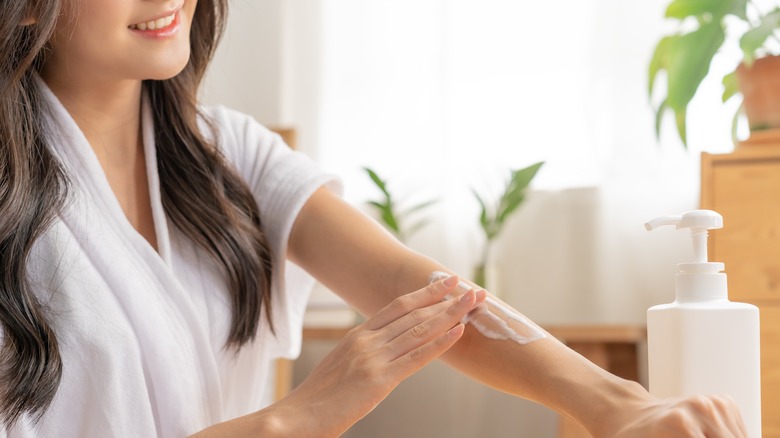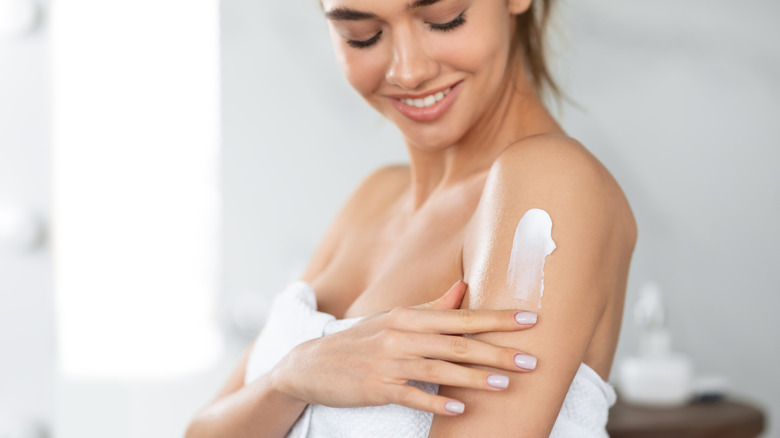Is Retinol Effective On Your Body? Here's What We Know
Few trends within the wellness industry have risen to stardom and maintained popular favor like retinol. The active skincare ingredient has been nothing short of exalted among skincare experts and enthusiasts alike for its sheer efficacy. Retinol functions as a potent exfoliant, helping to revitalize new skin below the surface through promoting skin cell renewal and collagen stimulation. While the vitamin A derivative has typically been used on the face in skincare routines, retinol has also begun to take off in body skincare. If its skin-smoothing properties work wonders on the face, then why not on the body?
Skin may be the largest human organ, but it differs on the face from the body. Facial skin is comparatively thinner and prone to hastened changes from continuous exposure to external environmental stressors, such as pollution and the sun's UV rays. The body is frequently covered by clothing and its skin cell turnover occurs at a slower rate, so notable skin changes begin to manifest later than in the face; hence why most skincare routines prioritize high quality ingredients for facial skin, leaving the body as an afterthought.
"Most people only pay attention to protecting and hydrating the skin on their bodies. But if we can get in the habit of using multipurpose products, like body retinol lotions, then it's a step in the right direction," Corey Hartman, a board-certified dermatologist, shared with Harper's Bazaar. But can retinol actually do anything for your body?
How retinol works on the body
The average skincare routine focuses solely on products that have been formulated for the face's needs, but with the recent phenomenon of retinol in body skincare, the body is finally receiving the attention it deserves – and tailored to its own needs. The surge in retinol body products can be credited in part to practical and non-irritating formulas developed specifically for use on the body. Per Harper's Bazaar, some advancements in formulation, such as time-released stabilized and encapsulated options, have helped to minimize common side effects of retinol, including dryness and irritation.
Some studies have found retinoid helpful for addressing immediate skin concerns, such as body acne and hyperpigmentation, along with improving the appearance of crepey, wrinkled, and saggy skin. These changes are most apparent in areas of the body where the skin isn't as inherently firm, such as the thighs and backsides of the arms. Hartman added to Harper's Bazaar, "It also stimulates collagen to firm up saggy areas, like around the knees and the arms, and gets rid of dullness." Retinol and its collagen-boosting properties can also be used as a spot treatment to target particular areas on the body with a thin layer of application, from discoloration to stretch marks. It is also imperative to seek hydrating ingredients to mitigate side effects and employ a routine of slow usage until the skin has fully acclimated to the retinol.
Proving retinol's body efficacy
Although retinol has reached superstar status, there is still "much less data out there about the effects of retinol in cosmetics on body skin versus on facial skin," said Angelo Landriscina, a board-certified dermatologist in Brooklyn, in an interview with The Cut. "Body skin is, overall, structurally different from facial skin." In other words, there's no need to go rush to buy it for your body anytime soon, but it can't hurt to try it.
Don't be fooled by the similar sizing of retinol body and face products when it comes to swapping lotions and comparing results. Many body products actually possess a lower percentage of retinol than those meant for the face. "The results may be more subtle or may take longer to achieve than when using standard retinol products on facial skin," Landriscina explained to The Cut. Still, whether it's applied to skin on the face or body, sensitivity to the sun is guaranteed, which can cause the retinol to be less effective for anti-aging benefits. Daily use of broad spectrum sunscreen must follow retinol use, but it also belongs in every facial and bodily skincare routine – with or without retinol.
There are many benefits to this powerhouse ingredient, but it's important to consult with a dermatologist prior to using it because no skin type, and thus skin reaction, is the same. Specific skin conditions, such as body acne and keratosis pilaris, may see improvements more quickly than hyperpigmentation and uneven textural changes. Smooth skin can't be achieved overnight, but consistent and safe use of retinol, coupled with sunscreen, is a key investment in the long run.


